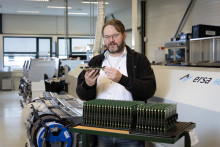SciSports founder Giels Brouwer (UT-alumni) was featured in a major article by prestigious Dutch football magazine and website Voetbal International. In an interview Giels talked about SciSports’ successes, his experiences with football clubs and the role of data in football. We have outlined the main content.
On reducing the time and expenses to find the right player:
‘No one wants to waste millions, when it was possible to get an indication beforehand that the player would not fit the system. Since the main part of the budget is related to player acquisition and salaries, a transfer flop could be disastrous. To avoid these risks we are able to provide the clubs with general and detailed background analysis based on the clubs own requirements and statistics. The background analysis will contain football related and non-football related data. Recently we examined for example, that a striker had intentionally injured a teammate on two occasions. A club was interested in signing this player but based on this data they did not buy him.’
On the acceptance of data:
‘In general, the acceptance of using data in the football industry has increased. Based on our knowledge and experience, we are convinced that data analysis will be a major part in the search and selection process of a player transfer in the future. For the clubs we are supporting at the moment, we are able to execute a quick and focused search in all competitions worldwide. Based on the clubs requirements we present them a first selection of potential players who will fit their system. Based on this, the club scouts and our data scouts will have the possibility to spend their time on pre-selected players rather than spending a lot of time by viewing a lot of games.
‘Just like coaches, data analysts are arrogant people. They think their methods and analytics are the best. If you are not able to share thoughts and are open for both worlds, you will create two factions. We are focusing on bringing both worlds together to improve success and to reduce risks!’
‘Hopefully, everyone will stay open-minded and we will stop characterizing it as a revolution. On the one hand, revolution is great because it means a change is coming. On the other hand, revolution means overthrowing existing structures. That’s a bridge too far for me because the use of statistics is mainly useful when it happens concurrently with football experts who know how to value data. I’m convinced in the added value of data analysis.’
On the future of data:
‘Football statistics are still in their early stages. Currently, data companies only generate data on players who have the ball. Everything on the pitch that happens without the ball, is not captured in data. Because of that, you will never be able to give a complete picture of player qualities. Only an indication. We are also working on making it possible to collect that part of data, with a system we call BallJames.








